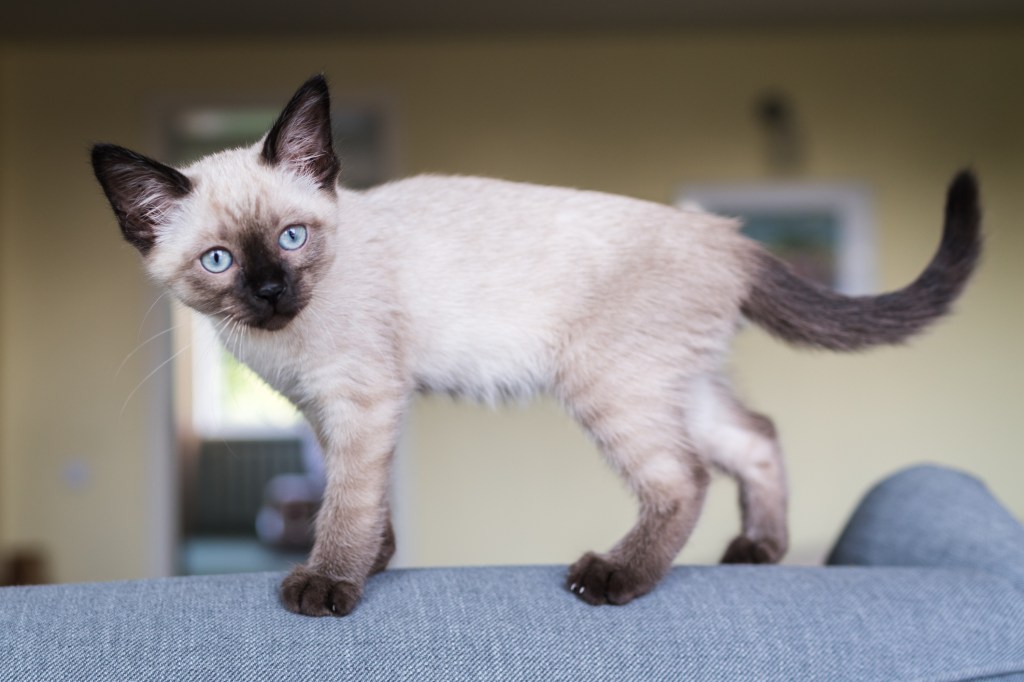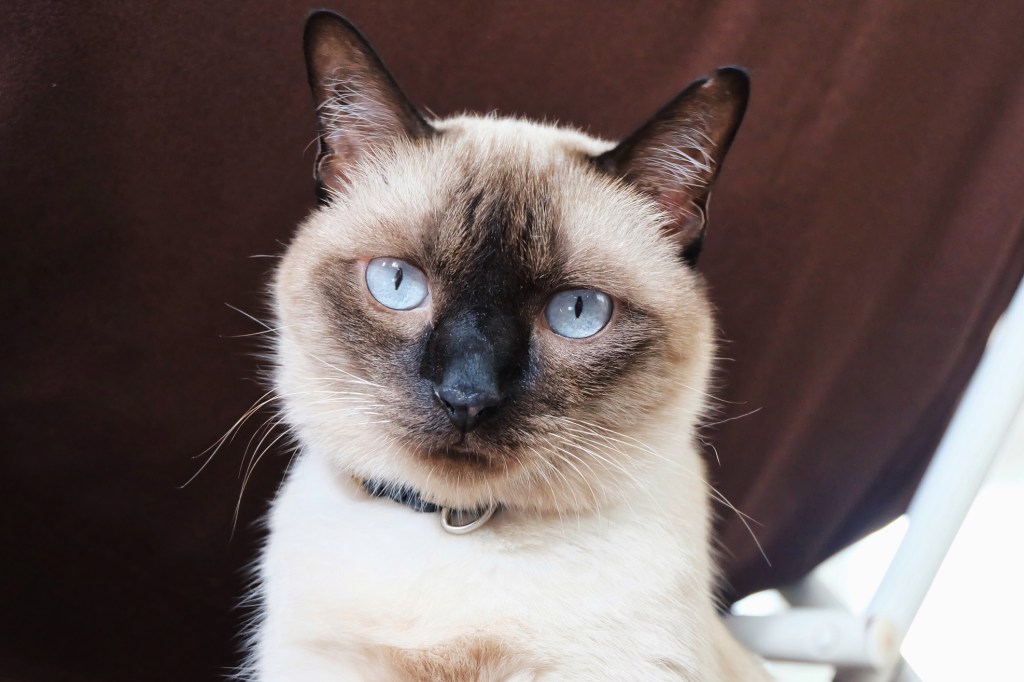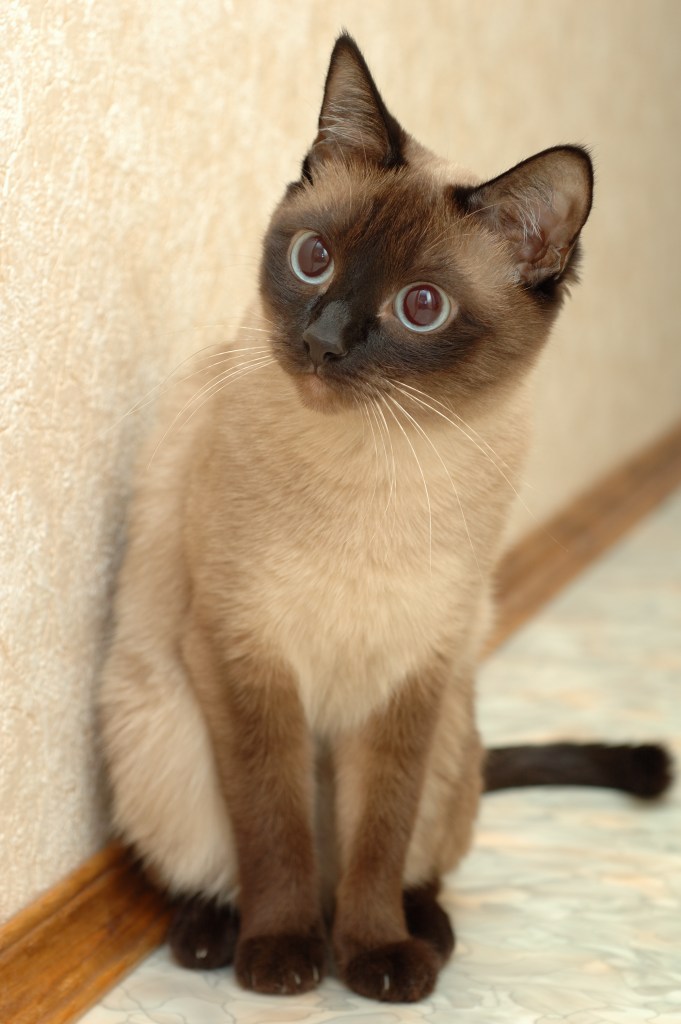With their pointed coats, almond-shaped blue eyes, and short, soft, luxurious fur, you may think the Thai cat is the same as a Siamese cat. They’re both Wichien Maat landrace breeds from Thailand, formerly known as Siam, but the Thai cat is the “old-style” Siamese, before breeders and fanciers preferred the slender, elongated look we know today. The Thai cat, or “moon diamond” in Thai, is the closest relative to the original breed of pointed cat native to Thailand, and remains as the breed dedicated to preserving the rich history and bloodline.
What are the characteristics of a Thai cat?
Similarly to the Siamese, the Thai cat has a vocal, sociable, and affectionate personality. You won’t want to leave your Thai cat home alone for long periods of time, as they thrive on human companionship. They’re intelligent and love interactive play and games, so keep your laser pointer ready. They won’t simply be content as a lap cat, though their loud purring might dupe you into thinking so. If you work from home, a Thai cat might seem like your coworker who always stops by to chat or ask what you’re working on, while sitting on your keyboard. While rare outside of Thailand, this robust cat adapts well to indoor living, and would make a wonderful companion for someone looking for a more playful kitty.
When considering a Thai kitten, it’s advisable to prioritize adopting from rescue organizations or shelters to provide a loving home to a cat in need. However, if you decide to purchase, it’s crucial to choose a reputable breeder. Conduct thorough research to ensure that the breeder follows ethical practices and prioritizes the well-being of their cats. Reputable Thai kitten breeders prioritize the health and temperament of their cats, conduct necessary health screenings, and provide a nurturing environment for the kitties. This active approach ensures that you bring home a healthy and happy kitty while discouraging unethical breeding practices.
Quick Facts
- Origin: Thailand
- Size: Medium (7-12 pounds), graceful and athletic build, not as slender as Siamese.
- Breed Group: Landrace (naturally occurring breed).
- Lifespan: 12-16 years.
- Coat: Short, soft, and lustrous, usually warm beige (“diamond gold”). Can also come in pointed patterns with darker markings.
- Temperament: Friendly, affectionate, playful, energetic, intelligent, communicative, independent streak.
- Exercise Needs: Moderate – daily playtime and mental stimulation, enjoys interactive games.
- Training: Highly trainable with positive reinforcement, often “talkative” and enjoys learning tricks.
- Grooming: Minimal – weekly brushing to remove loose hair.
- Health: Generally healthy, but potential for hypertrophic cardiomyopathy (HCM) and progressive retinal atrophy (PRA).
- Wichienmaat means “moon diamond” in Thai.
- The Tamra Maeo, also known as the Treatise on Cats, contains early breed standards for Thai cats.
- Thai kittens are born white, and develop their coats as they age. Their coats are also temperature-sensitive, and darken in colder areas.
Thai Cat Pictures




-
Affectionate with Family
Some cat breeds are typically independent and aloof, even if they’ve been raised by the same person since kittenhood; others bond closely to one person and are indifferent to everyone else; and some shower the whole family with affection. Breed isn’t the only factor that goes into affection levels; cats who were raised inside a home with people around feel more comfortable with humans and bond more easily.

See Cats Less Affectionate with Family -
Amount of Shedding
If you’re going to share your home with a cat, you’ll need to deal with some level of cat hair on your clothes and in your house. However, shedding does vary among the breeds. If you’re a neatnik, you’ll need to either pick a low-shedding breed or relax your standards. This furniture cover can make it easier to clean up cat hair and keep it off your sofa!
-
General Health
Due to poor breeding practices, some breeds are prone to certain genetic health problems. This doesn’t mean that every cat of that breed will develop those diseases; it just means that they’re at an increased risk. If you’re looking only for purebred cats or kittens, it’s a good idea to find out which genetic illnesses are common to the breed you’re interested in.
-
Potential for Playfulness
Some cats are perpetual kittens—full of energy and mischief—while others are more serious and sedate. Although a playful kitten sounds endearing, consider how many games of chase the mouse-toy you want to play each day, and whether you have kids or other animals who can stand in as playmates. A classic wand cat toy like this one is perfect for playful felines!
-
Tendency to Vocalize
Some breeds sound off more often than others with meows, yowls, and chattering. When choosing a breed, think about how the cat vocalizes and how often. If constant “conversation” drives you crazy, consider a kitty less likely to chat.
-
Kid-Friendly
Being tolerant of children, sturdy enough to handle the heavy-handed pets and hugs they can dish out, and having a nonchalant attitude toward running, screaming youngsters are all traits that make a kid-friendly cat. Our ratings are generalizations, and they’re not a guarantee of how any breed or individual cat will behave; cats from any breed can be good with children based on their past experiences and personality.
-
Friendly Toward Strangers
Stranger-friendly cats will greet guests with a curious glance or a playful approach; others are shy or indifferent, perhaps even hiding under furniture or skedaddling to another room. However, no matter what the breed, a cat who was exposed to lots of different types, ages, sizes, and shapes of people as a kitten will respond better to strangers as an adult.
-
Easy to Groom
Some breeds require very little in the way of grooming; others require regular brushing to stay clean and healthy. Consider whether you have the time and patience for a cat who needs daily brushing. You should definitely pick up this awesome de-shedding tool for cats of any hair length!
-
Intelligence
Some cat breeds are reputed to be smarter than others. But all cats, if deprived the mental stimulation they need, will make their own busy work. Interactive cat toys are a good way to give a cat a brain workout and keep them out of mischief. This scratcher cat toy can keep your smart kitty busy even when you’re not home!
-
Pet Friendly
Friendliness toward other household animals and friendliness toward humans are two completely different things. Some cats are more likely than others to be accepting of other pets in the home.
Thai History
The Thai cat breed comes from Thailand, where these kitties are known by the name Wichienmaat, which translates into “moon diamond.” In the 1800s, the breed was brought to Great Britain to be given to the royal family as a gift–a move which helped spread news about these felines around the world.
The Thai was officially given advanced new breed status by the International Cat Association (TICA) in 2009. These days, you can find Thais in shelters or in the care of rescue groups. So make sure to consider adoption if you decide that this is the breed for you!
Thai Size
The Thai is a medium-sized cat. As is always the case, exact size standards might vary.
Most Thais weigh between eight and 15 pounds. However, many cats can be larger or smaller than average.
Thai Personality
First of all, the Thai is a very people-focused feline. These cats will often follow the humans of a household around from room to room as they seek out company. The Thai is also a very vocal breed of cat, with many owners insisting that their Thai cats talk to them to let them know how they’re feeling!
They’re also inquisitive and curious creatures who love to explore the world around them, so living in a home with lots of safe climbable furniture would be a bonus. Just be warned that, due to the Thai’s very sociable nature, they are cats who definitely need what might seem like constant attention. If you have a household with young children, that’s great, as the Thai will happily become like a new best friend and play buddy to your kids.
Thai Health
Thais are generally considered to be healthy cats, although it’s always important to schedule regular wellness visits with your cat’s vet. There aren’t any breed-specific health problems associated with the Thai, but always keep an eye out for signs that your cat might be in distress or pain.
- Amyloidosis: This is a disease that occurs when a type of protein called amyloid is deposited in body organs, primarily the liver in Siamese.
- Asthma: Asthma in cats, also known as feline bronchial disease or feline asthma, is a respiratory condition characterized by inflammation and constriction of the airways. It is a common condition in cats and can affect felines of any age or breed
- Congenital Heart Defects: Congenital heart defects in cats refer to abnormalities in the structure or function of the heart that are present at birth. These defects can vary in severity and may affect different parts of the heart. While some congenital heart defects may not cause significant health problems, others can lead to serious complications.
Thai Care
As with all cats, it’s important to keep up your Thai’s regular veterinary checkups to detect any health concerns early. Your vet can help you develop a care routine that will keep your cat healthy.
Beyond scheduling yearly wellness visits with your vet, make sure that you pick up a scratching post for your Thai cat’s living environment. This can help promote healthy scratching and keep the cat’s nails in good condition.
The Thai cat’s ears should be examined regularly for signs of dirt building up or possible infection. Talk to your vet about starting a regular teeth brushing regimen that will suit your Thai. Your vet can advise you about specific brands and techniques. Finally, the Thai will definitely appreciate a sturdy cat tree to play and interact with. This will help keep the kitty stimulated and satisfied and may prevent behavior issues from arising.
Thai Coat Color And Grooming
The Thai cat can be found in any point color, including tortie point, torbie point, and tabby point. When it comes to grooming, the short-haired Thai cat is pretty low maintenance and will be good with weekly brushing sessions. This will help ward off the chances of any mats forming. Although, ask your vet for tips if you find that your Thai doesn’t take to sitting still and being brushed at first.
In terms of climate, most Thais are fairly adaptable felines, but they do tend to prefer warmer rather than colder places to live. Just remember to always make sure that there’s enough shade and fresh water available during the hotter months.
Children And Other Pets
The Thai is a wonderful match for families with young children. Just make sure that early socialization takes place and boundaries are properly set on both sides. Supervise all interactions between kids and cats, especially early on.
When it comes to other household pets, the outgoing Thai usually fares well with most other domestic animals, including dogs. But always make sure to supervise early interactions between the new cat and existing pets. Sometimes these relationships are very much dependent on the individual pets’ personalities. Ultimately, early socialization really pays off with this breed. Make sure to reward your Thai for good behavior when you bring them home to your family!
Thai Rescue Groups
It may be hard to find a breed specific rescue for Thai cats. However, you may want to try shelters and rescues that cater to all types of cats, including Thai cats, as well as your local shelter. Here are some nonprofit rescues you can try:
More Info For You
If you’re also looking for a dog, check out DogTime’s dog breed page!





